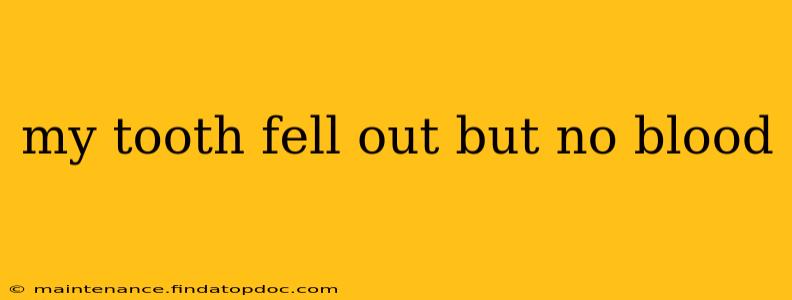Losing a tooth can be a frightening experience, especially when it happens unexpectedly and without bleeding. While the lack of bleeding might seem less alarming, it's crucial to understand the potential causes and seek appropriate dental care. This comprehensive guide will explore various reasons why a tooth might fall out without bleeding, addressing common concerns and providing valuable insights.
Why Did My Tooth Fall Out Without Bleeding?
Several factors can contribute to a tooth falling out without significant bleeding. The absence of blood doesn't necessarily indicate a less serious issue; in fact, it often points to a specific underlying cause. Let's explore some possibilities:
1. Advanced Periodontal Disease (Gum Disease):
This is a common culprit. Severe gum disease leads to the breakdown of the tissues supporting your teeth. Over time, the bone around the tooth resorbs, weakening its hold. The tooth may become loose and eventually fall out with minimal bleeding, as the supporting structures have already deteriorated.
2. Tooth Decay and Root Damage:
Extensive tooth decay can weaken the tooth structure, particularly the root. If the decay reaches the root, it compromises the tooth's stability, causing it to fall out. Again, because the supporting structures are weakened, bleeding might be minimal or absent.
3. Trauma or Injury:
While impact trauma often results in immediate bleeding, a less forceful injury might cause a tooth to loosen gradually. The tooth may fall out later with minimal or no bleeding because the surrounding tissues have already healed somewhat.
4. Loose Tooth (Naturally Falling Out):
Children losing their baby teeth experience minimal or no bleeding. While less common in adults, a tooth that's already become loose might fall out without profuse bleeding, especially if the periodontal ligament (the tissue holding the tooth in place) has already begun to degrade.
What Should I Do If a Tooth Falls Out Without Bleeding?
Regardless of the cause, losing a tooth warrants immediate attention:
- Find the Tooth (If Possible): Carefully retrieve the tooth, handling it by the crown (the visible part), not the root. Store it in milk or saliva to keep it moist.
- Contact Your Dentist Immediately: Schedule an appointment as soon as possible. Your dentist will perform a thorough examination to determine the cause of the tooth loss and recommend the best course of treatment.
- Gentle Cleaning: Before seeing your dentist, gently rinse the area with warm salt water to keep it clean. Avoid any harsh scrubbing.
Frequently Asked Questions (PAAs)
These questions often appear in online searches related to tooth loss:
Is it normal for a tooth to fall out without bleeding?
While bleeding is often associated with tooth loss, it's not always present, particularly if the underlying cause involves gradual bone loss or weakening of the periodontal ligament. The lack of bleeding doesn't diminish the urgency to see a dentist.
Can a loose tooth fall out without bleeding?
Yes, a severely loose tooth can fall out with minimal or no bleeding, especially if the supporting structures are already compromised due to periodontal disease or other underlying issues.
What are the causes of adult tooth loss?
Adult tooth loss is primarily caused by periodontal disease (gum disease), tooth decay (cavities), trauma, or occasionally, certain medical conditions.
What are the treatments for adult tooth loss?
Treatment options vary depending on the cause and severity of the tooth loss. Your dentist might recommend treatments such as root canal therapy, periodontal treatment, dental implants, bridges, or dentures.
How can I prevent tooth loss?
Practicing excellent oral hygiene, including regular brushing, flossing, and professional cleanings, is essential for preventing tooth loss. Maintaining a healthy diet and avoiding excessive sugar intake are also crucial.
Conclusion
Losing a tooth, whether or not it involves bleeding, signifies a need for professional dental care. Don't delay seeking a dentist's expertise. Prompt diagnosis and treatment can often prevent further complications and preserve your oral health. Remember, maintaining good oral hygiene is your first line of defense against tooth loss. Regular dental check-ups and professional cleanings are essential for early detection and prevention of potential problems.
